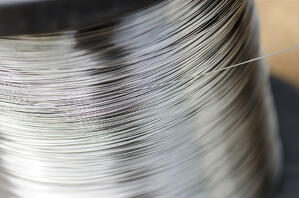 Every day, companies in the manufacturing sector have to make choices that can affect the efficiency and productivity of their production lines. One choice that many might underestimate the importance of is the base material they use for their basket. After all, one type of steel is just as good as any other, right?
Every day, companies in the manufacturing sector have to make choices that can affect the efficiency and productivity of their production lines. One choice that many might underestimate the importance of is the base material they use for their basket. After all, one type of steel is just as good as any other, right?
Wrong.
There are hundreds of different kinds of steel alloys that can be broken up into several broad categories; all with unique characteristics that alter their suitability for different tasks. Two of the most recognizable categories of steel are plain steel and stainless steel.
The Problem with Plain Steel for Parts Cleaning
For regular materials handling applications where contact with water or corrosive chemicals isn’t likely, plain steel can be a great material choice. It’s strong, relatively low-cost compared to most stainless alloys, and is readily available through most metal forming companies.
However, processes such as vapor degreasing, ultrasonic parts cleaning, sterilization, and other parts washing processes often involve using water, chemical cleaners, and corrosive fluids that would rapidly oxidize or corrode unprotected plain steel. This would shorten the useful life of any parts cleaning basket made of plain steel dramatically.
At the least, using plain steel for parts cleaning baskets means having to frequently replace the baskets as they wear out, driving up costs. Worse is the risk of corroded baskets failing during parts production and causing damage to your parts and production equipment.
Stainless steel alloys, with their protective oxide layer, are more resistant to corrosion. This makes for a tougher, longer-lasting basket for parts cleaning. However, as durable and reliable as stainless steel is for parts cleaning baskets, there are a few things to look for when ordering custom metal forms made from stainless steel.
Looking for a Reliable Stainless Steel Expert
Most custom metal forming shops treat stainless steel as a side business in favor of working with plain steel. This has been known to cause more than a few issues with custom stainless steel product orders.
For example, if a manufacturer doesn’t thoroughly clean off/mill their electrodes and feed wheels when moving from plain steel to stainless, particles of plain steel materials can contaminate the surface of the stainless material. The issue here is that the plain steel embedded in the surface of the stainless will rust, contaminating the work piece.
Additionally, failing to properly mill the electrodes of an electric welder can result in low-quality welds in stainless steel products. This can reduce the overall strength of the basket and keep it from being able to support the full weight of held parts.
To get the most out of your investment in stainless steel, you need to work with a partner that specializes in working with stainless steel—Marlin Steel, for instance. About 80% to 90% of all the work that Marlin Steel does is stainless steel, with grades 304 & 316 being the most common.
As stainless experts, Marlin’s engineers know how to work with stainless steel and always mill off their electrodes and feeders between jobs to prevent contamination of the stainless alloys they work with.
Also, unlike most plain steel-focused manufacturers, Marlin keeps a sizeable stock of stainless steel wire and sheet metal in stock—roughly $700,000 worth of inventory. This allows Marlin to command better pricing on stainless since there’s less need to order steel on short notice when the price of steel may be higher.
Stainless steel can make for an excellent parts cleaning basket to protect your delicate, high-precision parts throughout your finishing process. Finding the right stainless steel manufacturer helps ensure that you get a high-quality basket that makes the most out of your investment.



.gif)


